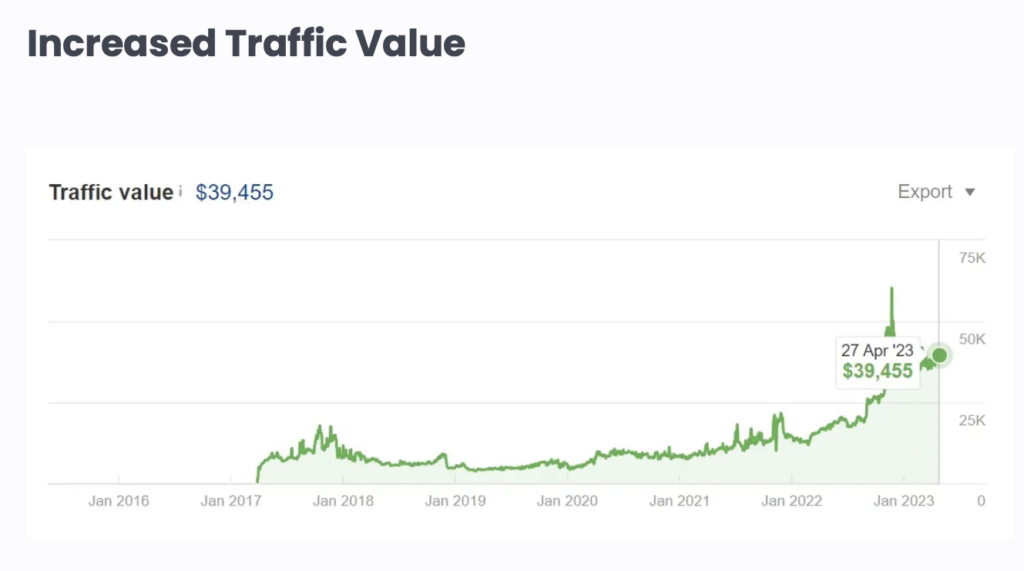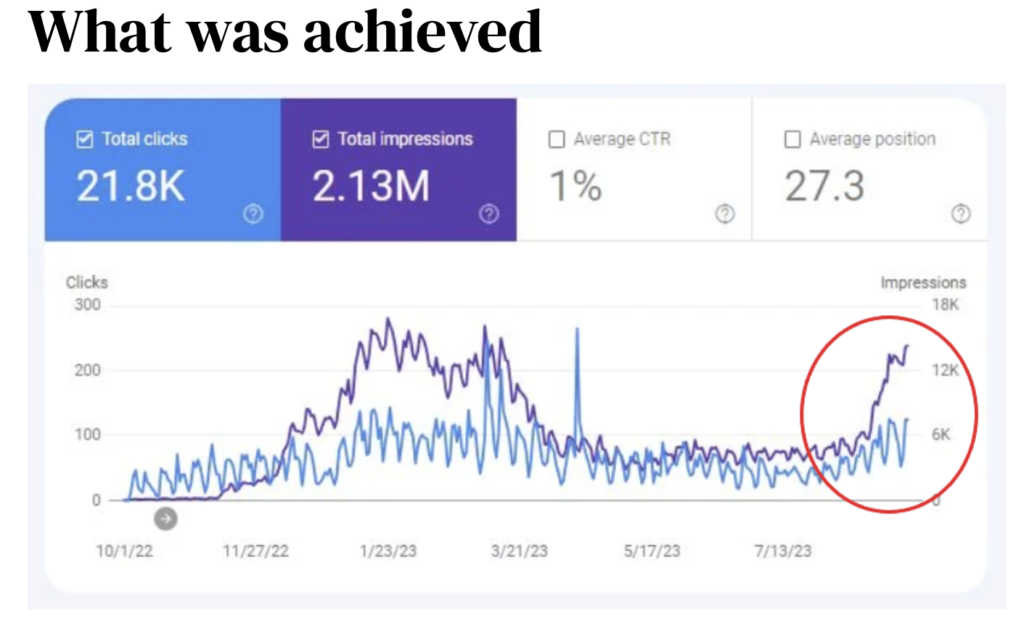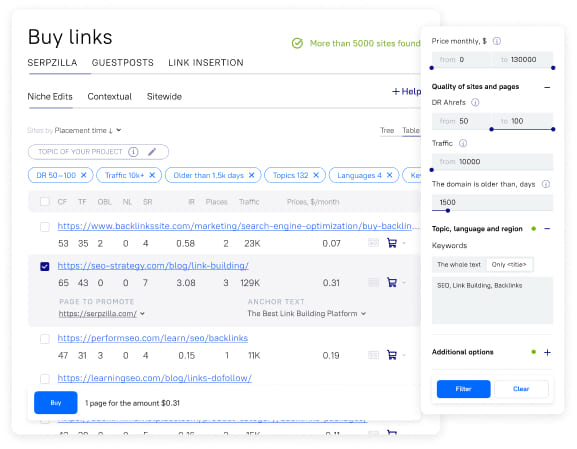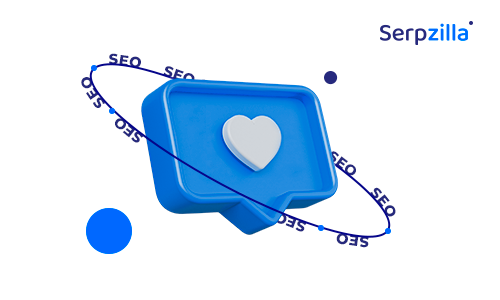Within the ecommerce sector, the factor of success lies in the balance between two critical link building components: internal and external linking.
Internally, website owners can structure their navigation through a composed roadmap where the main page leads to category pages, turning direct users towards specific listings. This form of internal linkage can both streamline user experience, as well as significantly impact your site’s SEO standing.
Yet, On-Page SEO isn’t the only factor that holds weight for the e-commerce sector. The external sphere, built upon link building strategies, fuelled by backlinks from reputable sources, holds increasingly equal weight. These external links now wield substantial influence over your website’s visibility, authority, and credibility.
In this article, we will embark on an exploration of the coming strategies that will dominate the world of ecommerce link building for 2025. We will look at the convergence of internal and external link building methods, offering unique insights into the tactics that are shaping the SEO domain.
Ecommerce Link Building Strategies for 2025
The ecommerce industry competitively thrives via effective link building strategies that can boost visibility, credibility, and authority. As the sector expands, a plethora of strategies have emerged that can effectively amplify your online presence. Let’s dive into eight key strategies that will shape link building in ecommerce.
- Conducting Competitions and Promotions: Launching interactive campaigns, contents and promotions that can engage users in your products is an effective way to bring traffic to your sided. Added to this, you can encourage them to share links, thus generating additional organic traffic and backlinks to your website.
- Cooperating with Influencers and Bloggers: This method has proven itself as a steady way to guarantee exposure within your chosen niche – the trend will likely continue into 2025. Not only can you choose experts and influencers in your niche to associate your brand with, but you can also generate quality backlinks via sponsored content or reviews.
- Product Use Guides: Focus on creating comprehensive guides that can fully showcase things like product use, benefits, and tips – this not only educates customers and stays consistent with branding, but also attracts backlinks from any sites that may be seeking informative resources.
- Product Reviews: Boost your credibility and attract organic backlinks by encouraging and facilitating authentic and genuine product reviews by either industry experts or customers. This will help your product reach a larger audience, whilst also providing useful and relevant content.
- Website Branding: It is essential to establish a strong brand presence across multiple channels to foster brand recognition, this will naturally attract organic backlinks from various sources that mention or reference the brand.
- Guest Blogging: Guest blogging offers business owners the chance to contribute valuable content to high authority websites in their niche, this not only builds authority and awareness of your brand, but also will earn you backlinks from the host site.
- Using Social Platforms: Fully utilize and leverage social media platforms to engage with audiences and encourage sharing of your products and brand. This can lead to increase visibility and social signals that directly impact search rankings.
- Local SEO: Fully optimizing for local search helps you to capture traffic from specific geographical areas, utilizing local directories to acquire key backlinks from local sources.
In 2025, whilst new strategies may emerge, these strategies remain critical for successful link building in the e-commerce sector. Proactive adaptation and innovation within these approaches will heavily impact your brand’s online presence and sales.
Examples of successful link building for Ecommerce
In the ecommerce sector, maximizing success often relies on the implementation of effective link building strategies. By examining real cases studies, it becomes clear that utilizing optimal tactics have driven brands forward in their digital niche. Let’s fully explore these examples, analyzing the success behind their link building approaches to create actionable insights for 2025.
Outreach Monks and Represent
According to Outreach Monks, the streetwear brand Represent witnessed phenomenal growth after launching SEO efforts together. The comprehensive link building campaign, which was initiated in 2022, doubled their monthly traffic to 132,000, produced higher keyword rankings to 42k, and even tripled estimated monthly traffic value to $40k.
Under increased link building efforts, the brand’s success allowed them to increase their link building budget even further, towards sustained success.

AIContentfy
In another compelling ecommerce case study detailed by AIContentfy, a Nordic B2B ecommerce company witnessed remarkable growth and turnaround in just three weeks, doing so by prioritizing the revival of lost traffic and visibility on Google and partnering with AIContentfy to drive substantial growth.
Through the implementation of a strategic link building strategy, the ecommerce company witnessed a huge 100% boost in traffic and an even more remarkable 200% increase in Google impressions. This elevated their domain rating from 25 to 33, whilst the brand also gained essential insights into optimizing their SEO strategy.
Again, this case study highlights the essential role of link building in increasing website traffic, particularly in an already competitive B2B ecommerce sector. Through utilizing a focused strategy centered around high-quality backlinks and targeted page mapping, AIContentfy’s client saw almost immediate success with the assurance of sustainable traffic that passed previous peaks achieved through other marketing methods.

Whilst these case studies highlight the power of successful link building strategies, they also challenge the narrative around buying links. At Serpzilla, we emphasize the effectiveness of ethical and strategic link building partnerships. These case studies serve as evidence to how engaging a link building agency can enhance traffic and performance for the ecommerce sector.
Ecommerce Link Building Techniques
Many ecommerce sites face a unique obstacle in link building due to the vast array of product pages many have, as well as limited resources. However, Google’s algorithm shows a remarkable flow of link juice, a concept where external links to specific pages can lead to a redistribution of ranking power across your website via internal links. This part of the algorithm stresses the interconnectivity of web pages, as well as the amplification of authority in a site-wide sense.
Typically, SEO link building services focus their efforts on category pages, as well as the main site – this bolsters overall site authority. However, budget constraints tend to impact the effectiveness of this strategy, particularly when dealing with many SKU catalogs that may easily exceed tens of thousands of products.
However, if your objective is to highlight a certain product, exceptions may arise. This situation necessitates the placement of external links onto specific product pages. For example, in a competitive ecommerce sector such as mobile phone, strategies would involve boosting the visibility for specific products, like the iPhone 15 Pro or Samsung S23 Ultra.
By adopting this targeted approach, you can maximize the impact of external links and harness their ability to boost the visibility, ranking power, and authority of specific product pages. Whilst, on a broader scale, the strategy may revolve around a focus on site authority as a whole, the exception lies in boosting specific product pages, especially in competitive areas.
Ecommerce link building requires a well-thought out strategy and surgical precision. On average, 10-20 links will suffice in propelling a product page to the top of search engine rankings. The strategy? Embark on careful site selection, ensure a diverse anchor list, and balance DoFollow/NoFollow and sponsored links. Focusing on aligning with competitors’ link masses should be key, yet your strategy aims to look beyond this – analyzing, adapting, and pushing beyond competitors for ranking superiority.

Tools and Services for Effective Link Building
To fully boost an ecommerce campaign’s online presence, you will need to employ advance link building tactics that are tailored to current search engine metrics. Here’s a breakdown of a number of strategies that are designed for SEO success:
Tailored Outreach Campaigns
Naturally, outreach remains a primary method of SEO marketing, which involves direct contacting with site owners for external link placements. The process varies from things such as personalized messages, to using CRM-powered campaigns, like Pitchbox to optimize outreach efforts:
- Crafting Effective Messages: Boost your response rates significantly through personalization.
- Optimizing Contact Discovery: Use tools like Snov.io, or manually employ site exploration to analyze and uncover key publisher contacts.
Serpzilla
At Serpzilla, we believe in ethical and organic link building strategies that allow you to target specific keywords and streamline link acquisitions without prolonged negotiations. Serpzilla provides the following services specific to ecommerce:
- Strategic Link Purchases: Optimize through acquiring links from main pages, or bulk-endorsed link for certain category or product pages. This is often with high wholesale discounts.
- Guest Post Reviews: Gain product reviews on specific news or niche specific sites – this can strengthen your brand visibility.

Influencer Marketing and PR Strategies:
As aforementioned, you should work on harnessing the power of influencer and expert collaborations, as well as strategic PR campaigns, such as:
- Product Exchange for Reviews: Offer the ability to exchange products for authentic reviews that always include backlinks.
- Localized PR Initiatives: Create a local buzz through events or product launches – engage with local bloggers, experts, and media to utilize potential mentions as backlink opportunities.
Leveraging Brand Mentions and Crowd Marketing
Work to maximize brand mentions and community engagement through the following methods:
- Maximize Brand Mentions: Utilize tools like Ahrefs and SEMrush to identify existing brand mentions and maximize the potential to convert them into active backlinks.
- Forums and Social Platforms: Proactively focus on forums and other social media platforms, engaging with brand ambassadors by negotiating profile signature links.
Incorporating a blend of these complex strategies that are tailored to the ecommerce sector can significantly boost a brand’s link profile. This will result in increased visibility, authority, and sustained growth within the competitive ecommerce sector.
Ecommerce Link Building Mistakes to Avoid
In order to boost your rankings, link building in the ecommerce sector must be done properly. Here are a few mistakes to avoid when creating an SEO strategy.
Neglecting Competitor analytics
Mistake: Disregarding the power of an in-depth analysis of competitor strategies may lead to wasted efforts and resources when conducting your link building efforts.
Solution: Before selecting promotion queries, properly conduct a deep analysis of competitor positions and rankings – this is crucial. Assess things like site quality and fully scrutinize their link profiles to identify feasible strategies and set a realistic SEO goal.
Ignoring Technical and On-Page SEO
Mistake: Underestimating the power of the groundwork of technical SEO and on-page optimization can blunt the effectiveness of your link building efforts.
Solution: Take measures to ensure that you have considered technical aspects and on-page SEO. Understand that a slow or badly optimized website will not benefit from link building in an effective way. Always prioritize these aspects to properly establish a solid foundation for effective link building.
Overemphasis on Product Pages
Mistake: Focusing only on product pages for link purchases, lacking a clear and systematic approach.
Solution: Avoid random link acquisitions directed only at specific product pages. Develop a well-understood and defined link building strategy that includes several pages based on both relevance and importance. By conducting competitor analysis, you can aid yourself in the process of identifying key pages for optimal link placement.
Boost your SEO results! Link building has become fast and easy with Serpzilla. Buy quality backlinks on authority websites with high DR.

Random Link Purchases
Mistake: Random and unsystematic link purchases without any clear direction or strategy can lead to outcomes to do not provide significant SEO and sales boosts.
Solution: Avoid purchasing links without careful consideration. Follow guides on how to properly build links organically. Develop a system of link acquisition which aligns with both your business goals and competitor insights. Naturally, a well-crafted strategy works to ensure a targeted and effective approach towards link placements that are brand consistent.
In the increasingly competitive world of ecommerce, success rests on adopting a balanced approach, a strong internal technical structure, and smart link building collaborations. Looking forward to 2025, the key lies in mixing a robust internal setup up alongside strategic partnerships that can boost and positively impact SEO metrics and brand credibility.
Thoroughly analyze competition, influencer opportunities, and detailed guides whilst prioritizing technical SEO aspects will also fortify your online presence in a sustainable sense. Real life success stories and case studies prove the transformative power of optimal link building, ensuring sustained success in the ecommerce sector.








